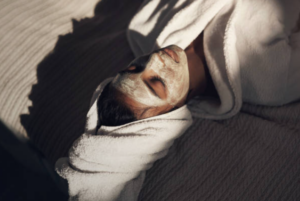Examining the Connection Between Self-Care and Wellbeing

In our fast-paced and demanding modern lives, finding balance and prioritizing self-care has become essential for maintaining overall wellbeing. The beauty industry has long been associated with external appearance, but in recent years, there has been a growing recognition of the profound connection between beauty and mental health. This beauty blog explores the intricate relationship between self-care, beauty practices, and mental wellbeing, highlighting the impact of nurturing both our inner and outer selves for a healthier and more fulfilling life.
Scientific research has shed light on the powerful connection between self-care practices and mental health. The way we care for ourselves, both physically and emotionally, can have a profound impact on our overall wellbeing. Self-care is not just about indulging in pampering activities; it involves taking intentional steps to nurture our mind, body, and spirit.
One of the most significant benefits of self-care practices is their ability to reduce stress and manage anxiety. Engaging in activities that promote relaxation and mindfulness, such as meditation, yoga, or taking a leisurely walk in nature, can help to lower cortisol levels (the stress hormone) and calm the nervous system. By incorporating these practices into our daily routine, we can build resilience to stress and improve our ability to cope with life’s challenges.
Self-care practices have been shown to boost mood and enhance emotional wellbeing. Activities that bring joy and pleasure, like spending time with loved ones, pursuing hobbies, or engaging in creative endeavors, release neurotransmitters such as dopamine and serotonin, which are associated with feelings of happiness and contentment. Additionally, engaging in self-compassionate practices, such as positive self-talk and self-acceptance, can improve self-esteem and emotional resilience.
Depression is a prevalent mental health condition that affects millions of people worldwide. While self-care alone may not be a substitute for professional treatment, it can be a valuable complementary approach to managing depression. Engaging in self-care activities that promote self-compassion, mindfulness, and social connection can help alleviate symptoms of depression and improve overall mental wellbeing.
Beauty Practices for Improved Mental Health
Skincare Rituals: A Mindful Path to Radiant Skin
Skincare routines provide an excellent opportunity for self-care and mindfulness. As you cleanse, tone, and moisturize, take the time to be present and attentive to the sensations on your skin. Incorporate products with natural scents, like rose or chamomile, to further enhance the relaxation and emotional benefits.
Makeup as Self-Expression: Embrace Your Unique Beauty
Makeup is not solely about covering imperfections; it can be a powerful tool for self-expression. Play with different looks, experiment with colors, and allow your creativity to flow freely. Embrace makeup as an art form and a means of highlighting your features and personality.
Hair Care: Nourish Your Locks, Nourish Your Soul
Haircare rituals can be incredibly soothing and meditative. Take the time to massage your scalp, indulge in a hair mask, and savor the feeling of freshly washed and conditioned hair. Invest in products that promote healthy hair and indulge in regular trims to keep your locks looking their best.
Body Pampering: Embracing Sensory Pleasures
Treat your body to regular pampering sessions, such as a luxurious bath with scented oils, body scrubs, or massages. These practices not only promote physical relaxation but also provide an opportunity to connect with your body and practice self-compassion.

Mindful Makeup Removal: A Ritual of Letting Go
Just as beauty rituals are essential, so is the practice of mindful makeup removal. Take the time to cleanse your face gently and with care, releasing the day’s tensions and allowing your skin to breathe freely. This simple act can symbolize letting go of daily stressors and preparing yourself for rest and rejuvenation.
Nurturing Mental Health Holistically
While beauty practices can significantly impact mental health, it is equally important to address mental wellbeing holistically. Nurturing your mental health from within will complement external self-care practices, creating a harmonious and balanced approach to overall wellbeing.
Mindfulness and meditation are powerful tools for nurturing mental health from within. Mindfulness involves being fully present in the moment, observing our thoughts and emotions without judgment. Through regular meditation practice, we learn to cultivate inner peace, reduce rumination, and increase self-awareness. This heightened awareness allows us to respond to stressors more effectively and enhances our ability to manage challenging situations with equanimity.
Regular physical activity is not only beneficial for our physical health but also has a profound impact on mental wellbeing. Engaging in exercises we enjoy, whether it’s a yoga session, a dance class, or a refreshing run outdoors, releases endorphins—the brain’s feel-good neurotransmitters. These endorphins help alleviate stress, reduce anxiety, and promote an overall sense of happiness and relaxation. Physical activity also provides an outlet for emotional expression, helping us release tension and pent-up emotions.

The connection between nutrition and mental health is well-established. A balanced and nutritious diet provides the essential nutrients that support brain health and emotional wellbeing. Incorporating a variety of fruits, vegetables, whole grains, lean proteins, and healthy fats into our diet can contribute to improved mood and cognitive function. Additionally, maintaining stable blood sugar levels through balanced eating patterns helps regulate mood and energy levels.
Quality sleep is fundamental for mental health and overall wellness. During sleep, the brain processes information, consolidates memories, and regenerates. A restful night’s sleep is essential for emotional resilience, problem-solving abilities, and the regulation of emotions. Establishing a consistent bedtime routine and creating a sleep-conducive environment can significantly improve the quality of our rest.
Human beings are social creatures, and social connections play a crucial role in our mental health. Building and maintaining meaningful relationships with friends, family, and supportive communities provide us with a sense of belonging and emotional support. Engaging in social activities and meaningful conversations can enhance feelings of happiness, reduce feelings of loneliness, and promote emotional wellbeing.
Spending time in nature offers a unique form of self-care that nurtures our mental health. Studies have shown that being in natural settings, whether it’s a park, forest, or beach, can reduce stress levels, improve mood, and increase feelings of calmness and connectedness. Incorporating nature walks, outdoor exercises, or simply taking a moment to appreciate the beauty of nature can have a profound impact on our mental wellbeing.
Beauty communities and social media platforms have become spaces for self-expression and support. They offer a sense of belonging and connection, enabling individuals to share beauty tips, mental health experiences, and self-care journeys. However, it is essential to approach social media mindfully and avoid comparisons that can lead to feelings of inadequacy.
Beauty and mental health are interconnected not only in personal settings but also in professional environments. Many beauty industry professionals, such as makeup artists, hairstylists, and estheticians, serve as confidants to their clients, providing a listening ear and a safe space to talk about mental health concerns. This highlights the importance of mental health awareness and support within the beauty industry.
Breaking Beauty Stigmas
In a world heavily influenced by media and social norms, beauty standards can often perpetuate unrealistic ideals and create pressure to conform to a narrow definition of beauty. These standards can have detrimental effects on mental health, leading to feelings of inadequacy, low self-esteem, and body image issues. Breaking beauty stigmas involves challenging these harmful norms and embracing a more inclusive and diverse perspective on beauty.
Every individual possesses a unique set of features and attributes that make them special. Breaking beauty stigmas means recognizing and celebrating these individual differences rather than striving for a homogenous and one-size-fits-all concept of beauty. Embracing our individuality fosters a sense of self-acceptance and self-love, promoting positive mental health outcomes and enhancing overall wellbeing.

The beauty industry plays a significant role in shaping beauty standards and trends. By advocating for inclusivity and diversity in the beauty industry, we ensure that all individuals, regardless of race, ethnicity, gender, age, or body size, feel represented and valued. Brands that embrace inclusivity send a powerful message of acceptance and contribute to positive mental health outcomes for consumers.
Breaking beauty stigmas requires education and awareness about the impact of beauty norms on mental health. By promoting mental health education, we can empower individuals to recognize harmful beauty standards and develop resilience against their negative effects. Understanding the connection between beauty ideals and mental health can lead to greater self-compassion and acceptance.
The connection between beauty and mental health is profound, with self-care practices playing a pivotal role in fostering emotional wellbeing and overall happiness. Engaging in skincare, makeup, haircare, and body pampering mindfully can provide individuals with a powerful toolkit for managing stress, anxiety, and negative emotions. Combining external beauty practices with holistic self-care, including mindfulness, physical activity, nutrition, sleep, and social connections, creates a harmonious approach to mental health and overall wellbeing. As we embrace self-care as an act of empowerment and prioritize our mental health, we can redefine beauty standards and cultivate a more compassionate and accepting world for ourselves and others. Remember, beauty starts from within, and the journey to mental wellness and self-acceptance is an ongoing and transformative process.




